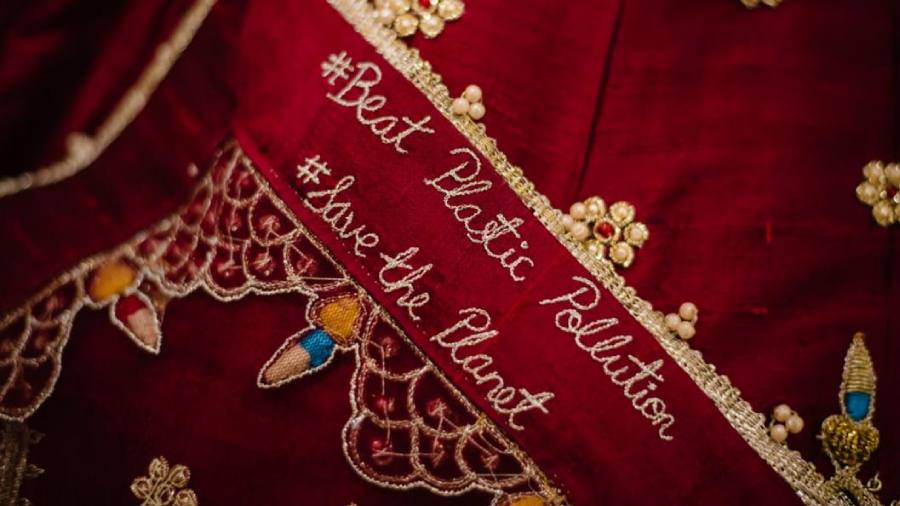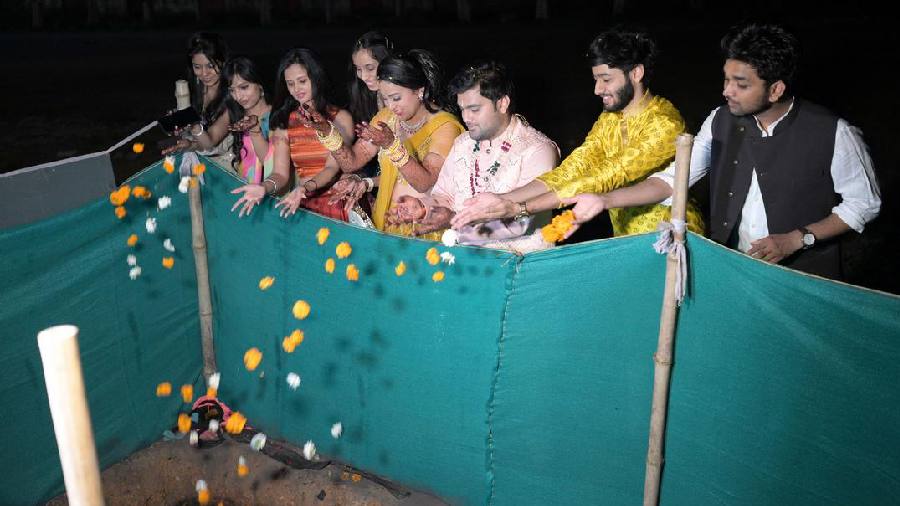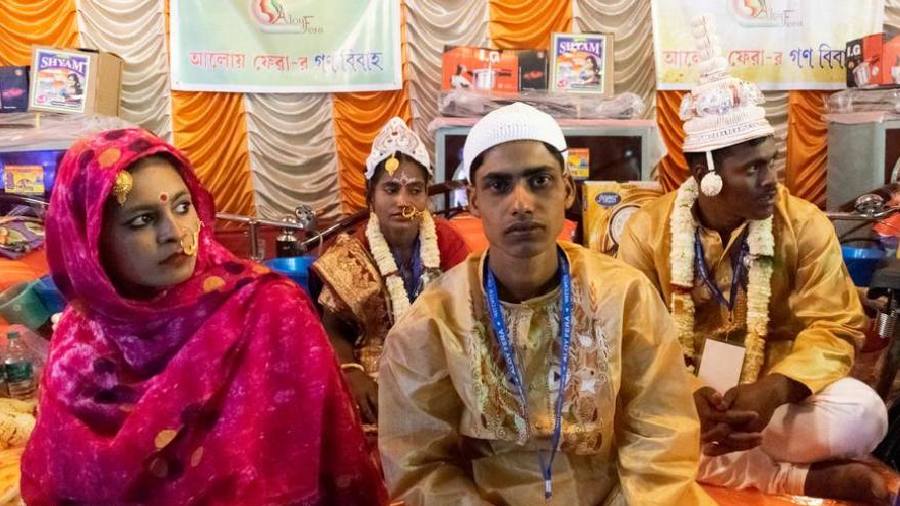When Nupur Agarwal and Ashwin Malwade, who had met each other at a beach cleanup drive in Mumbai, decided to get married in 2019, they were adamant that their wedding not contribute further to global warming.
"We knew we were going to have a zero-waste wedding because there was no way we wanted to generate the kind of waste that we had picked up on the beach," Nupur Agarwal told DW.
The couple failed to find a wedding planning firm that could help them organize their special day in an eco-friendly way, so they decided to do it on their own.
The members of Ashwin's baraat, the groom's wedding procession, were instructed to arrive at the venue on electric vehicles. Nupur wore her mother's wedding dress, which had been upcycled for the occasion and was decorated with hashtags such as #saynotoplastic and #climatecrisisisreal.

Nupur Agarwal's wedding dress was decorated with eco-friendly hashtags Deutsche Welle
'Zero-waste is difficult but low-waste is easy'
The event was such a success that many couples started reaching out to them for advice on how to plan zero-waste weddings. They decided to turn this sideline into their profession, setting up an event planning and consulting company called Greenmyna.
In the past three years, they have planned seven weddings and given advice to many more couples. They boast that Greenmyna has neutralized over 2 tons of carbon and composted more than 5 tons of waste.
But this is almost nothing in a country where the wedding industry is believed to be the fourth largest economic sector, with an estimated 10 million weddings taking place annually.
"A typical three-day wedding generates about 700 to 800 kilos of wet waste and 1,500 kilos of dry waste. The carbon emissions for such weddings stand at approximately 250 tons," Ashwin Malwade told DW.
Pooja Devani and Arjuna Thakker, both non-resident Indians, also wanted to do as little damage to the planet as possible with their wedding in the city of Pune in western India. But they had invited 140 guests from the United Kingdom.
"The question was how can we be eco-friendly when we are flying people to India?" said Pooja Devani.
In the end, they decided to offset their carbon footprint by planting trees with the help of Greenmyna. "We realized it's difficult to have a zero-waste wedding, but we can easily have a low-waste wedding."

At one Greenmyna wedding, there was even a compost pit for the guests' waste Deutsche Welle
Offsetting carbon emissions
Shanay Jhaveri, who got married in December, also turned to Greenmyna for help in offsetting carbon emissions, deciding to plant a Miyawaki forest, a densely planted forest featuring local species.
"I also had e-invites and the invites that I printed were on seed papers, which we sowed as part of a ceremony with close relatives."
Arindam Ghosal, a project manager based in Dubai, was also looking for a way to plan his sister's wedding in January in a more sustainable way. He came across Climes, a climate finance company that allows individuals and enterprises to buy carbon offsets through online credits, and used the company to neutralize 2,250 kilos of carbon dioxide.
"I wasn't aware of carbon neutralization till 2021," explained Ghosal. "It was after COP 27 that I became curious to learn more about greenhouse gas emissions."
"Our motto is to cut what you can and neutralize what you can't," said founder Anirudh Gupta, who launched the firm in 2021 and now already has over 20 consumer brands as partners.
"We need to simplify climate action, make it easily accessible, economically viable and fun to do," he said, explaining that to make climate-related action more fun, Climes gave wedding guests credits and QR codes to scan and choose a climate solutions project to help finance.
"The money moves in the form of Climes credits. Each Clime costs 2 Indian rupees (€0.023 and $0.024) and offsets 1 kilo of carbon from the atmosphere," he said.
The company has boasted of offsetting more than 26 tons of carbon emitted from four wedding ceremonies.

Arindam Ghosal gave a carbon-free wedding to his sister and brother-in-law, Arunima and Subhadeep Deutsche Welle
Food waste could feed poor
According to the online platform Statista, Indian weddings have the largest number of guests in the world, with an average of about 500 attendees. A 2017 study by the Indian Consumer Affairs Ministry in the Delhi region showed that it was not uncommon for wedding buffets to feature 200 to 300 different dishes.
NGOs have said there is often excess food waste that is not only harmful to the environment but could also go to disadvantaged people.
"On average, excess food left from weddings could feed up to 100 people," said Abdul Wahid, who volunteers in New Delhi with the Robin Hood Army, an NGO that distributes food to less fortunate sectors of society.










